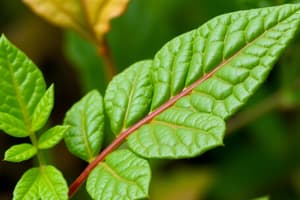Podcast
Questions and Answers
Ekologi mempelajari interaksi antara organisme hidup dan lingkungannya.
Ekologi mempelajari interaksi antara organisme hidup dan lingkungannya.
True (A)
Taksonomi berfokus pada penamaan dan klasifikasi organisme berdasarkan karakteristik fisik saja.
Taksonomi berfokus pada penamaan dan klasifikasi organisme berdasarkan karakteristik fisik saja.
False (B)
Ekologi akuatik mempelajari ekosistem air tawar dan laut.
Ekologi akuatik mempelajari ekosistem air tawar dan laut.
True (A)
Genetika adalah cabang biologi yang mempelajari transfer informasi genetik dari generasi ke generasi berikutnya.
Genetika adalah cabang biologi yang mempelajari transfer informasi genetik dari generasi ke generasi berikutnya.
Biologi sel hanya mempelajari struktur sel, bukan fungsinya.
Biologi sel hanya mempelajari struktur sel, bukan fungsinya.
Ekologi adalah cabang biologi yang mempelajari hubungan antara organisme dengan lingkungannya.
Ekologi adalah cabang biologi yang mempelajari hubungan antara organisme dengan lingkungannya.
Taksonomi hanya berfokus pada pengklasifikasian tumbuhan saja.
Taksonomi hanya berfokus pada pengklasifikasian tumbuhan saja.
Genetika mempelajari pewarisan sifat dari induk kepada keturunannya.
Genetika mempelajari pewarisan sifat dari induk kepada keturunannya.
Biologi sel hanya fokus pada struktur sel saja.
Biologi sel hanya fokus pada struktur sel saja.
Mutasi genetik selalu merugikan bagi organisme.
Mutasi genetik selalu merugikan bagi organisme.
Flashcards are hidden until you start studying
Study Notes
Biology and Botany: Exploring Ecology, Taxonomy, Genetics, and Cell Biology
Ecology
Ecology is the scientific study of the interactions between living organisms and their environment. It examines the relationships between various species, including predators and prey, competitors, and mutualists. Additionally, ecologists study the impacts of environmental factors such as climate, topography, and weather conditions on ecosystems and their inhabitants. Ecology is further divided into several subdisciplines, including population ecology, community ecology, terrestrial ecology, aquatic ecology, physiological ecology, behavioral ecology, and conservation biology. These different branches focus on specific aspects of ecological processes, such as the dynamics of populations, the structure and function of communities, and the relationships between organisms and their environment,.
Taxonomy
Taxonomy, often referred to as systematics, is concerned with naming, classifying, arranging, and describing living organisms based on shared characteristics. It involves categorizing species into groups and assigning them scientific names to facilitate communication among scientists and ensure consistency when discussing various species. The process of classification includes examining physical traits, DNA sequence analysis, and other features to establish evolutionary relationships between species. The field of taxonomy also encompasses fields like phycology, which focuses on algae, and mycology, which deals with fungi. Additionally, taxonomists may specialize in certain groups, such as mammals, birds, insects, or plants, depending on their area of interest,.
Genetics
Genetics is the branch of biology that deals with heredity and variation in inherited characteristics within species. It investigates how genetic information is passed down from parents to offspring, focusing on genes, gene expression, and genetic recombination during reproduction. Geneticists study the mechanisms behind inheritance patterns, identify the roles of individual genes in organism development, and investigate the relationship between genotype (the genetic makeup of an organism) and phenotype (observable traits). This field also involves studying the effects of genetic mutations, both beneficial and detrimental, on the functioning of organisms. Subfields of genetics include molecular genetics, classical genetics, genomics, and population genetics,.
Cell Biology
Cell biology, also known as cytology, centers around the structure, function, and interactions of cells, which are the basic unit of all living organisms. It explores cellular processes such as growth, division, and reproduction, as well as the role of cellular structures like mitochondria, ribosomes, and membranes. Cell biologists use techniques such as microscopy, cell culture, and imaging technologies to observe and analyze cellular functions. They also study the interactions between cells and their environment, such as communication pathways and the transfer of nutrients and waste products across cell membranes. Cell biology has significant implications for understanding health and disease, as many diseases arise from abnormalities in cellular processes or structures,.
In conclusion, the study of biology and botany covers a wide range of topics, each with its unique insights and applications. By exploring ecology, taxonomy, genetics, and cell biology, we can gain a comprehensive understanding of the natural world and the intricate processes underpinning life on Earth.
Studying That Suits You
Use AI to generate personalized quizzes and flashcards to suit your learning preferences.




